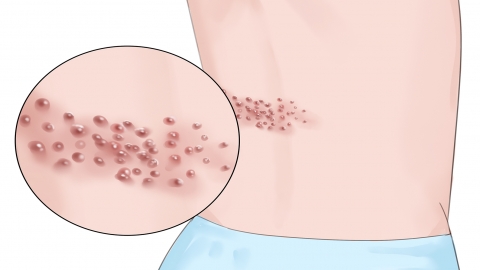How is herpes zoster treated?
Generally, shingles may be caused by factors such as decreased immunity, aging, varicella-zoster virus infection, long-term use of immunosuppressive agents, and radiotherapy or chemotherapy for malignant tumors. It is recommended to seek timely medical attention, identify the underlying cause, and improve the condition under a doctor's guidance through general treatment, medication, and other methods. A detailed analysis is as follows:

1. Decreased Immunity: When the body's immunity declines, the virus lying dormant in the nerve ganglia becomes activated, replicates, and invades nerves and skin, causing shingles, which manifests as blisters and severe pain along the nerve distribution. Adequate sleep should be ensured, fatigue avoided, and protein-rich foods consumed to enhance immunity. Additionally, antiviral medications such as acyclovir tablets, valacyclovir tablets, and famciclovir tablets should be taken as directed by a physician to inhibit viral replication.
2. Aging: With advancing age, the body's immune function gradually declines, reducing its ability to suppress viruses and increasing the likelihood of shingles, which is commonly seen in the elderly. Daily routines should include moderate exercise such as walking or tai chi to strengthen resistance, keeping warm to avoid colds, and receiving the shingles vaccine to lower the risk of developing the disease.
3. Varicella-Zoster Virus Infection: After the initial infection, the virus remains latent in the nerve ganglia. When the body's resistance decreases, the virus becomes active again, causing shingles, accompanied by low-grade fever and fatigue. Patients should apply topical medications such as penciclovir cream, recombinant human interferon α2b gel, and acyclovir ointment to the affected area as directed by a physician to relieve pain, and avoid scratching blisters to prevent infection.
4. Long-Term Use of Immunosuppressive Agents: Prolonged use of medications such as corticosteroids and cyclophosphamide suppresses immune function, triggering viral activation and resulting in shingles, which often occurs during treatment. Dosage or type of medication should be adjusted under medical guidance, while enhanced protection against infections is necessary. Antiviral drugs should be promptly administered upon symptom onset.
5. Radiotherapy and Chemotherapy for Malignant Tumors: Radiotherapy and chemotherapy damage the immune system, allowing the virus to become active and cause shingles, characterized by intense and prolonged pain. Patients should strengthen nutritional support during radiotherapy and chemotherapy by consuming foods rich in protein and vitamins. Pain-relieving medications such as gabapentin capsules, pregabalin capsules, and acetaminophen with oxycodone tablets should be used as directed by a physician to alleviate nerve pain and reduce suffering.
Daily care should include maintaining clean and dry skin, wearing loose and soft clothing to minimize friction, and avoiding spicy and irritating foods. Sufficient rest should be ensured, and staying up late avoided. Comprehensive treatment and care help promote rash resolution, reduce the risk of post-herpetic neuralgia, and maintain skin and nerve health.





